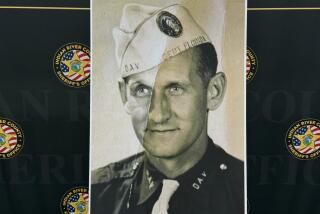Richard ‘Dick’ Winters dies at 92; WWII hero
Richard “Dick” Winters, the “Easy Company” commander whose World War II exploits were made famous by the book and television miniseries “Band of Brothers,” has died. He was 92.
FOR THE RECORD:
An earlier version of this article incorrectly referred to Winters as Williams in the second paragraph.
Winters died Jan. 2 at an assisted living facility in Campbelltown, Pa., after battling Parkinson’s disease for several years, said longtime family friend William Jackson. An intensely private man, Winters had asked that news of his death be withheld until after his funeral, Jackson said.
Winters became the leader of Company E, 506th Regiment, 101st Airborne Division — known as Easy Company — on D-Day after the death of the company commander during the invasion of Normandy.
“Basically you were saying, ‘This is it,’ and as a platoon leader you were saying, ‘I can’t let my men down,’” he told CNN in a 2004 program about the invasion. “And as you looked down, it took your breath. You were looking at a sight no man has seen before or since. You were looking at about 7,000 ships, about 4,000 landing craft, over 250 battleships.”
During that invasion, Winters led 13 of his men in destroying an enemy battery and obtained a detailed map of German defenses along Utah Beach. In September 1944, he led 20 men in a successful attack on a German force of 200 soldiers. In December, occupying the Bastogne area of Belgium during the Battle of the Bulge, he and his men held their position until the Third Army broke through enemy lines to relieve them. Winters was promoted to major shortly afterward.
The men Winters led expressed their admiration for their company commander.
“When he said ‘Let’s go,’ he was right in the front,” said William Guarnere, 88. “He was never in the back. A leader personified.”
Edward Heffron, 87, called Winters “one of the greatest soldiers I was ever under. He was a wonderful officer, a wonderful leader. He had what you needed — guts and brains.”
Winters was born Jan. 21, 1918. He grew up in Lancaster, Pa., and graduated from Franklin & Marshall College in 1941 with a bachelor’s degree in science and economics before enlisting in the Army, he said in his 2006 memoir “Beyond Band of Brothers.”
“After I graduated from F&M I immediately volunteered because you were going to get drafted,” he told the Intelligencer Journal in Lancaster in 2001. “So rather than get a job and then be drafted, I thought, ‘Let’s get this Army thing out of the road.’”
After returning home, Winters married his fiancee, Ethel, in May 1948, and trained infantry and Army Ranger units at Ft. Dix, N.J., during the Korean War. He started a company selling livestock feed to farmers, and he and his family eventually settled in a farmhouse in Hershey, Pa., where he retired.
Historian Stephen Ambrose interviewed Winters for the 1992 book “Band of Brothers,” upon which the HBO miniseries that premiered in September 2001 was based.
“Ambrose changed my life forever,” Winters said during an appearance at a Pennsylvania college in 2003.
Winters, in frail health in later years, has been the subject of a campaign to raise money to erect a monument in his honor near the beaches of Normandy.
“All the adulation meant so little to him except as a representative of the men and women who fought in World War II,” Cole Kingseed, a retired Army colonel who co-wrote Winters’ memoir, told the Patriot News in Harrisburg, Pa., in 2006.
In addition to his wife, Winters is survived by a daughter, son and grandson, Jackson said.
More to Read
Start your day right
Sign up for Essential California for the L.A. Times biggest news, features and recommendations in your inbox six days a week.
You may occasionally receive promotional content from the Los Angeles Times.






